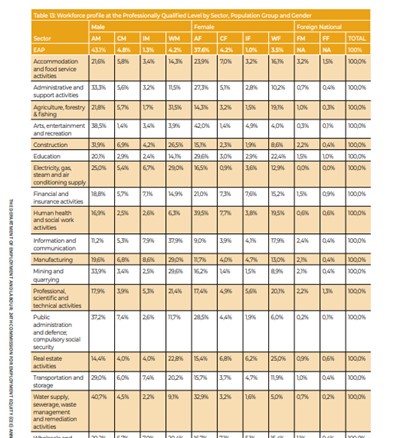Every quarter, researchers and analysts wait patiently for StatsSA’s Quarterly Labour Force Survey to assess the government’s efforts at “sustainable job creation”.
Yet over the past 10 years, the official unemployment rate has never fallen below 25.5% (excluding the 2020 Covid-19 lockdown, harshly enforced by the government).
The state of the labour market
Just over eight million South Africans are officially unemployed. Twelve million fall under StatsSA’s expanded definition (unemployed people who are discouraged and have given up looking but would work if someone offered them a job). There are an additional thirteen million South Africans who are “Not Economically Active”. These include students, homemakers, and people suffering from illness or disability.
Poverty-level crisis
According to the statistics, South Africa has a working age population of 41.5 million. More than half the country’s population is either unemployed or not economically active, locked out of opportunity.
To address this issue once and for all, the Government of National Unity must make hard decisions; overhaul labour regulations and legislation to make it easier for people to find work and for businesses to hire workers. The latest #WhatSACanBe paper on Labour: Make Work Pay, Support Those in Need, makes a bold proposal.
It argues that the country should implement a Job Seekers Exemption Certificate (JSEC) that will allow an unemployed South African the opportunity to access the job market without being subjected to race-based regulations and the minimum wage requirements, which unnecessarily increase risks for businesses and their sustainable operations. In this way, the JSEC recipient and the employer can meet each other halfway, without having the South African Government insert itself in the relationship.
‘Helicopter government’
It should come as no surprise to the readers that the ANC has historically deployed members of the South African Communist Party to key economic portfolios, such as former Employment and Labour Minister Thulas Nxesi and Dr David Masondo continuing in his role as Deputy Finance Minister. This is all part of the National Democratic Revolution’s goal of “disciplining” capital, big and small. Privately-owned business is an ideological plaything for the Tripartite Alliance. The Commission of Employment Equity, the Black Economic Empowerment Commission and other government institutions are filled with Alliance cadres fulfilling their duties to the NDR, as my senior colleague, Dr Anthea Jeffery, has written in Countdown to Socialism.
If the following example of racial bean-counting from the Annual Report of the Commission on Employment Equity doesn’t fit the definition of a ‘helicopter government’, then I don’t know what will.
Even foreign nationals aren’t spared.

IRR polling shows that nearly half of South Africans believe that the government should focus on unemployment and job creation more than on any other public issue.
Dignified work
“An economist working with government in the Eastern Cape tells a story of a meeting with the Department of Trade, Industry and Competition to discuss creating new jobs…the Department official asked why this was necessary as there was a social welfare network” wrote Greg Mills in his book Rich State, Poor State: Why Some Countries Succeed and Others Fail.
Keep in mind that the Eastern Cape has the country’s second highest unemployment rate in the country, behind only the North West Province. More than one million people born in the Eastern Cape now live in the neighbouring Western Cape. (StatsSA has recently confirmed “exclusions” to Census 2022 data, including demographic themes of income, employment, fertility and mortality. Read more here.) A social welfare network – even an extensive one such as South Africa’s – can never be a wholesale replacement for the dignity of a job.
The GNU and new provincial administrations provide a good opportunity to open up the discussion for much needed labour reform, to prevent further job losses and misery for the unemployed, businesses, and the economy.
Strategic retreat into more joblessness?
Mmamoloko Kubayi, the Chairperson of the ANC’s Sub-committee on Economic Transformation, recently wrote that her party still views its co-operation with the DA as a terrain of struggle, waxing lyrical about Mao’s China and Lenin’s Soviet Russia and saying that the GNU is a ‘strategic retreat’ for the National Democratic Revolution.
The ANC’s support for a Basic Income Grant “without exclusionary means testing or work-seeking conditions” effectively sees those who rely on social grants as people lacking agency and freedom. This is ironic, because it fought for the very freedom and opportunity that South Africans are being robbed of by the party’s celebratory and joyous exaltations of social grants every January 8th.
This situation is nothing short of scandalous and it is utterly demeaning.
Cyril Ramaphosa, as President and chief cheerleader for social grants, needs to overhaul the way not only government – but also the way society – sees jobs and employment.
Tackle poverty properly
The President describes social grants as “tackling poverty head-on”. The only way a government and society at large can properly tackle poverty head-on is to create jobs.
For as long as Sub-Saharan Africa continues on the path of economic illiteracy and pro-poor policy, poverty rates will rise and Africans will suffer the consequences.
If the GNU is serious about sustainable economic growth and job creation, the boffins in the economic cluster must first acknowledge that pro-poverty policies like BEE, NHI, EWC, and the Public Procurement and Employment Equity Acts are the reason why South Africa is where it is today.
The only way to get out of this socio-economic death spiral is to get the economy growing, by abandoning bad policy as a start.
In this new state of flux – as IRR CEO John Endres recently put it – proposals and plans for reform like the IRR’s Blueprint for Growth and #WhatSACanBe series can play a crucial role in forming policy in the seventh administration.
South Africans want change
Political parties across the spectrum have been pushing the same message for weeks; a multi-party government is SA’s best opportunity at putting South Africa on a path to economic growth and job creation.
Right. Now get to work. Scrap pro-poverty policies in favour of pro-growth policies. And make it all about #WhatSACanBe.
The latest paper can be read here.
[Image: wal_172619 from Pixabay]
If you like what you have just read, support the Daily Friend

